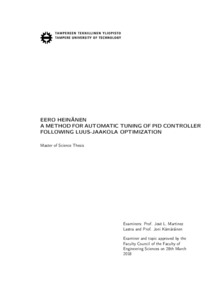A Method for automatic tuning of PID controller following Luus-Jaakola optimization
Heinänen, Eero Eljas (2018)
Heinänen, Eero Eljas
2018
Automaatiotekniikka
Teknisten tieteiden tiedekunta - Faculty of Engineering Sciences
This publication is copyrighted. You may download, display and print it for Your own personal use. Commercial use is prohibited.
Hyväksymispäivämäärä
2018-11-07
Julkaisun pysyvä osoite on
https://urn.fi/URN:NBN:fi:tty-201810242459
https://urn.fi/URN:NBN:fi:tty-201810242459
Tiivistelmä
Tuning parameters of a robot axis PID controller manually requires resources and expertise. Even a skilled person cannot always produce optimal tuning parameters manually. In addition, even if two robots would be copies of each other and should perform equally well with same tuning parameters, manufacturing tolerances and other physical differences and errors between axes cause them to perform differently with the same parameter settings. Using lower gains to prevent oscillations results in suboptimal performance. A robust autotuning method would increase axis performance, decrease axis tuning expenses and allow finding optimal tuning parameters for each mass-produced axis individually.
This thesis investigates suitable machine learning approach for OptoFidelity's OptoDrive servo controller automatic tuning. Integrated squared error was used as a performance index to evaluate the PID controller tuning. Luus-Jaakola optimization was selected from the learning based optimization methods to optimize the tuning of velocity and position PID controllers in OptoDrive. Controller performance achieved with learning based autotuning was compared to results from manual tuning. To speed up the tuning process, a novel method to adjust model based tuning method with results from learning based method was developed. Both autotuning methods were superior to manual tuning of position controller by decreasing the squared error over 90%. They also performed comparably to manual tuning of velocity controller. Significance of the results were tested with two-sample Kolmogorov-Smirnov test.
This thesis investigates suitable machine learning approach for OptoFidelity's OptoDrive servo controller automatic tuning. Integrated squared error was used as a performance index to evaluate the PID controller tuning. Luus-Jaakola optimization was selected from the learning based optimization methods to optimize the tuning of velocity and position PID controllers in OptoDrive. Controller performance achieved with learning based autotuning was compared to results from manual tuning. To speed up the tuning process, a novel method to adjust model based tuning method with results from learning based method was developed. Both autotuning methods were superior to manual tuning of position controller by decreasing the squared error over 90%. They also performed comparably to manual tuning of velocity controller. Significance of the results were tested with two-sample Kolmogorov-Smirnov test.
